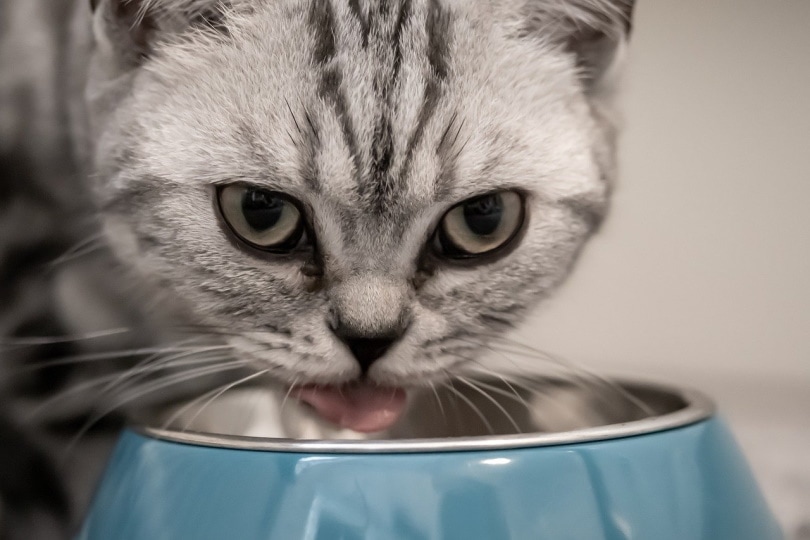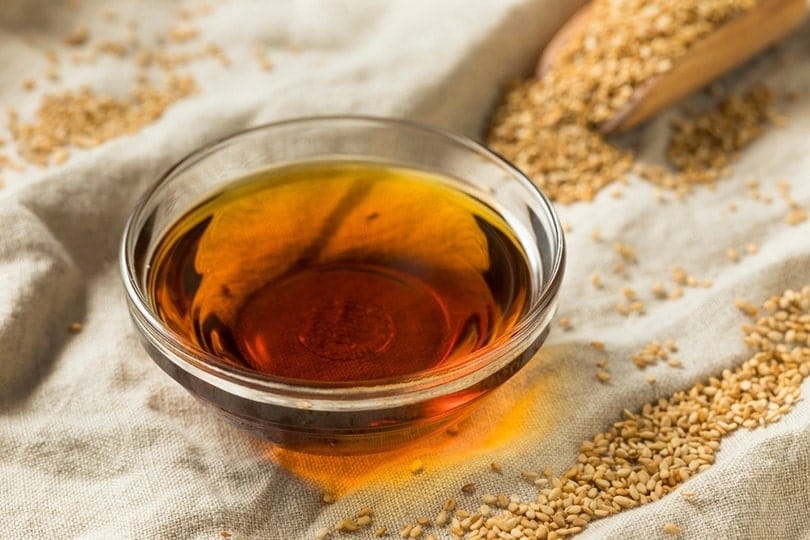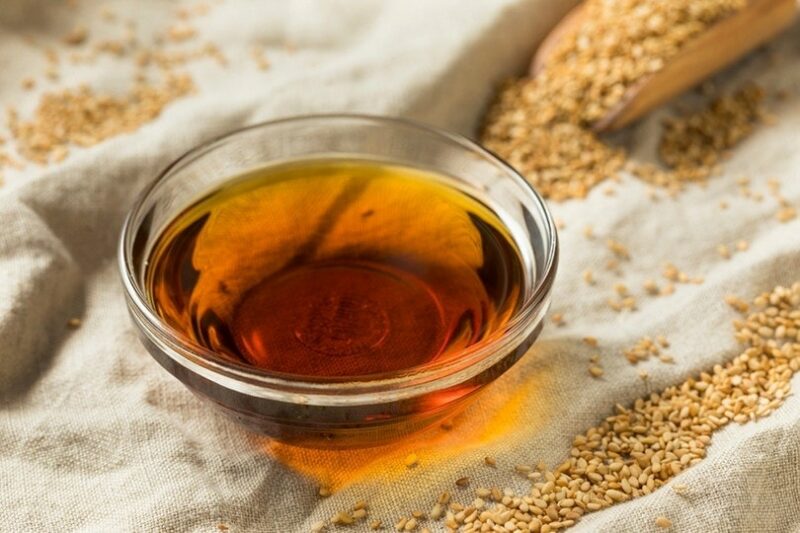Sesame oil is one of those “special” oils. Not every house has it in the pantry, like olive oil or coconut oil, but if you keep sesame oil in the pantry, you’ll be happy to know that it’s safe for cats to taste in very small doses.
Sesame oil is native to Chinese, Japanese, and Middle Eastern dishes. It’s made from raw or toasted sesame seeds and adds a nice nutty or neutral flavor to food, depending on whether the seeds were toasted.
An interesting fact about sesame oil (and sesame seeds) is that it has a ton of nutritional value to humans. But are these same nutritional benefits passed over to your cat?
Let’s find out.
Nutritional Benefits of Sesame Oil
- Calories per tablespoon: 120
- Protein: 0 grams
- Carbohydrates: 0 grams
- Fiber: 0 grams
- Sugar: 0 grams
- Fat: 14 grams
Here’s what we know about sesame oil: it’s loaded with antioxidants, omega-3 and omega-6 fatty acids, and tastes great. These wonderful perks give sesame oil the ability to help reduce inflammation, provide healthy fats, and protect your skin from the Sun.
In addition, sesame oil may help regulate blood sugar and add a little extra strength and shine to hair. It may even help reduce stress and depression because of the amino acid tyrosine present in the oil.
As if that’s not enough, recent rodent studies suggest that sesame seed oil helps reduce osteoarthritis. One 28-day study showed that rats had improved osteoarthritis-induced joint pain after receiving 0.5 milliliters per pound of sesame seed oil daily.
It’s hard to believe sesame oil can offer these many perks! Plus, have we mentioned it’s delicious? Your cat may think so, too. But before you reach for that bottle of sesame seed oil, we have to answer one question. Can your cat reap any of these benefits?
Do Cats Reap the Same Benefits?
The answer can be yes or no.
Here’s the thing—cats are obligate carnivores. You know we’ve mentioned it several times. It’s practically our slogan. That is because it’s the truth that holds weight. Many cat owners don’t understand the nutritional needs of an obligate carnivore and what it means to be one.
Since cats can’t synthesize all amino acids independently, they rely on the protein found in animal tissue. Cats need 11 essential amino acids, but the two most necessary in food are taurine and arginine.
Cats rely on animal-based protein for all their nutritional needs, like essential vitamins, minerals, and fat. Below is a list of all the vitamins and minerals cats need from meat.
Cat Nutrition 101
- Vitamin A
- Vitamin D
- Vitamin E
- Vitamin K
- Thiamine
- Riboflavin
- Folic acid
- Biotin
- Vitamin B12
- Choline
- Pantothenic acid
- Niacin
- Pyridoxine
- Iron
- Copper
- Manganese
- Calcium
- Phosphorus
- Chloride
- Magnesium
- Zinc
- Iodine
- Selenium
- Potassium
- Sodium
So, meat is important in a cat’s diet. But oil from plant matter? Not so much.
Because cats are obligate carnivores, the nutritional benefits of sesame oil aren’t as significant for them as meaty treats are.
However, that doesn’t mean they won’t get some of the benefits from sesame oil. Sesame oil can reportedly help remedy digestive issues and help pass hairballs. So, you may want to give your cat a taste now and then!
Your cat can still reap some sesame oil benefits if it’s within the recommended amount.
How Much Sesame Oil Can My Cat Have?

Cats need about 20%–24% of fat in their diet. Luckily, most cooking oil contains a decent amount of fat, usually around 14 grams per tablespoon.
Ideally, a teaspoon per week is the maximum amount of any oil a cat should have to avoid overconsumption. You can add it to your cat’s food or drizzle in the oil in the bowl as is.
What About Sesame Seeds?
Sesame oil comes from sesame seeds, so most of what we’ve covered in this post is valid for sesame seeds. However, sesame seeds are tiny. They could quickly get stuck in your cat’s teeth and gums and cause dental issues. They can also get stuck in your cat’s throat. The seeds are tiny and won’t choke your cat, but they may irritate your cat and cause coughing. Plus, cats are finicky and may not be interested in chewing on seeds.
We have found that it’s easier to offer sesame oil to a cat than to deal with picking sesame seeds out of your cat’s teeth.
Final Thoughts
Cats love sinking their teeth into meaty meals and treats. They reap the most benefits from this food since they’re obligate carnivores. But a little sesame oil no more than once a week is ok. Your cat can even gain some nutritional value from sesame oil.
Stick to the kibble (or wet food) and drizzle some sesame oil on your cat’s food weekly if you want to. If it’s your cat’s first time trying sesame oil, offer it separately so your cat doesn’t refuse its dinner. If your cat doesn’t like sesame oil, there’s no need to force them to eat something they don’t like.
Featured Image Credit by: Brent Hofacker, Shutterstock














